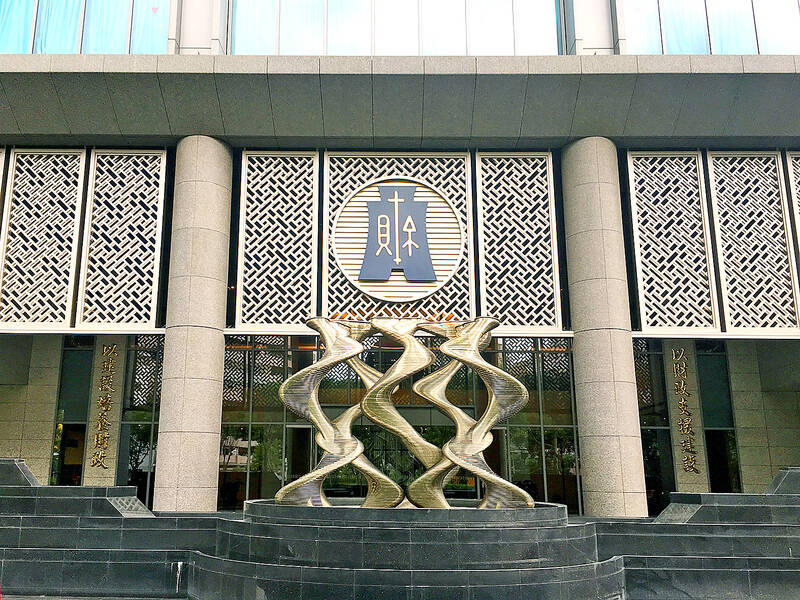The government last month collected NT$349.8 billion (US$10.79 billion) of tax revenue, soaring 50.9 percent from a year earlier, helped by solid gains in corporate and personal income as well as securities transactions taxes, the Ministry of Finance said yesterday.
Revenue from corporate income tax surged 73.2 percent year-on-year to NT$241.2 billion, as major local technology companies posted big increases in shipments of electronics used in artificial intelligence, ministry statistics official Liang Kuan-hsuan (梁冠璇) told a news conference in Taipei.
The significant rise in corporate income tax revenue was also due to a low comparison base from a year earlier, when temporary tax payment measures were suspended, Liang said.

Photo: Clare Cheng, Taipei Times
Revenue from personal income tax rose 15.8 percent to NT$46.7 billion, as people received higher cash dividends from their investments in listed firms and from transfers of real-estate properties, she said.
The central bank’s credit controls in September prompted some investors to exit the housing market to avoid potential price corrections, she said.
As a result, revenue from the land value increase tax was NT$7 billion, a 22.1 percent increase from a year earlier, the ministry’s report said.
The tax is paid when people resell houses.
Revenue from securities transactions rose 38.3 percent year-on-year to NT$431.1 billion as investors benefited from Taiwan Semiconductor Manufacturing Co’s (台積電) strong third-quarter earnings and positive outlook ahead of last week’s US presidential election, Liang said.
In the first 10 months, cumulative tax revenues rose 9 percent year-on-year to NT$3.3 trillion and already met the target set for the whole of this year, she said.
Overall excess tax revenue could reach NT$400 billion at the end of this year, she added.
Policymakers tend to be conservative when preparing the revenue budget to avoid a shortfall.

Semiconductor business between Taiwan and the US is a “win-win” model for both sides given the high level of complementarity, the government said yesterday responding to tariff threats from US President Donald Trump. Home to the world’s largest contract chipmaker, Taiwan Semiconductor Manufacturing Co (TSMC, 台積電), Taiwan is a key link in the global technology supply chain for companies such as Apple Inc and Nvidia Corp. Trump said on Monday he plans to impose tariffs on imported chips, pharmaceuticals and steel in an effort to get the producers to make them in the US. “Taiwan and the US semiconductor and other technology industries

SMALL AND EFFICIENT: The Chinese AI app’s initial success has spurred worries in the US that its tech giants’ massive AI spending needs re-evaluation, a market strategist said Chinese artificial intelligence (AI) start-up DeepSeek’s (深度求索) eponymous AI assistant rocketed to the top of Apple Inc’s iPhone download charts, stirring doubts in Silicon Valley about the strength of the US’ technological dominance. The app’s underlying AI model is widely seen as competitive with OpenAI and Meta Platforms Inc’s latest. Its claim that it cost much less to train and develop triggered share moves across Asia’s supply chain. Chinese tech firms linked to DeepSeek, such as Iflytek Co (科大訊飛), surged yesterday, while chipmaking tool makers like Advantest Corp slumped on the potential threat to demand for Nvidia Corp’s AI accelerators. US stock

The US Federal Reserve is expected to announce a pause in rate cuts on Wednesday, as policymakers look to continue tackling inflation under close and vocal scrutiny from US President Donald Trump. The Fed cut its key lending rate by a full percentage point in the final four months of last year and indicated it would move more cautiously going forward amid an uptick in inflation away from its long-term target of 2 percent. “I think they will do nothing, and I think they should do nothing,” Federal Reserve Bank of St Louis former president Jim Bullard said. “I think the

SUBSIDIES: The nominee for commerce secretary indicated the Trump administration wants to put its stamp on the plan, but not unravel it entirely US President Donald Trump’s pick to lead the agency in charge of a US$52 billion semiconductor subsidy program declined to give it unqualified support, raising questions about the disbursement of funds to companies like Intel Corp and Taiwan Semiconductor Manufacturing Co (台積電). “I can’t say that I can honor something I haven’t read,” Howard Lutnick, Trump’s nominee for commerce secretary, said of the binding CHIPS and Science Act awards in a confirmation hearing on Wednesday. “To the extent monies have been disbursed, I would commit to rigorously enforcing documents that have been signed by those companies to make sure we get